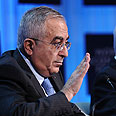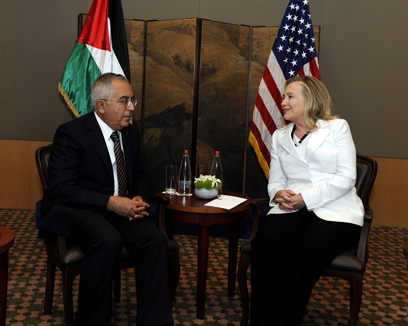
Salam Fayyad
צילום: AFP
Fayyad: Palestinian cause marginalized
Palestinian PM says Arab Spring, eurozone crisis and US elections have all but pushed Palestinian statehood bid off international community's agenda
Palestinian Prime Minister Salam Fayyad said Saturday that the Palestinian people's statehood aspiration have been all but pushed off the international community's agenda.
In an interview with the British Independent, Fayyad said that the world's focus on the Arab Spring, the financial crisis plaguing European Union countries and the nearing presidential elections in the United States, have "marginalized" the Palestinian cause.
Related stories:
- PA: Economy not strong enough for statehood
- World Bank: Palestinians not ready for state
- Palestinian official visits Auschwitz memorial
Fayyad told the newspaper that "Palestinian leaders were facing a path of growing untenability while the world largely focuses its attention elsewhere."
The Palestinian PM was critical of what he called "the West's failure to tackle Israel more seriously" over its failure to adhere to the Road Map and its settlement activity, which the PA says is a violation of international law.

Fayyad meets Clinton (Photo: Mati Stern)
"Our cause has never been this marginalized. Ever. This is our greatest challenge," he said.
Fayyad further warned that the Palestinian Authority itself was being undermined, citing Ramallah's financial difficulties and the deadlocked Israeli-Palestinian peace process, which he said was undermining the Palestinian people's faith in their government.
In the interview, the Palestinian PM was critical of the Mideast Quartet, for what he said was the panel's "misplaced" focus on relaunching the peace talks "at the expense of paying attention to Israel's violations."
He further blasted the international community for allowing Israel to expand settlement in the West Bank "with no consequences whatsoever."
"There is not a night when there are not multiple raids or incursions in Area A," he said, referring to the area that – according to the Oslo Accords – is under the PA's full control.
"It really is outrageous. There is not a single requirement of the Road Map that the government of Israel can assert they are complying with. Not one."
As for the stalled peace talks, Fayyad was quoted by the newspaper as saying that the "international emphasis on the (peace) process was not well placed."
He said that while he had no objections to Israeli and Palestinian negotiation teams meeting, but added that "When someone says they accept the two-state solution but they have overriding security interests… and there are all these facts on the ground they have to preserve, what exactly is left?"
Fayyad also urged the international community to "find a way to confront Israel over the occupation without in any way delegitimizing Israel itself."
"What the EU, indeed the whole world should do… is to ask the government of Israel – any government of Israel a straightforward question: 'Do you support as a solution to this conflict the emergence of a fully sovereign state of Palestine on the territory occupied in 1967, including east Jerusalem? Yes or no?'
“If they answer yes it is going to be very hard for them to explain how they continue to accept settlement expansion and settler extremism," he told the UK paper.
The same applied to the “violent manner in which the Israeli army deals with non-violent Palestinian protests. This is both wrong and can be extremely dangerous from a security point of view because you simply don’t know whether there is going to be an incident too many.” And indeed both create the feeling that there is a “feeble PA” that “cannot do anything to effectively represent the people by mobilizing international opinion to stop this.”
Addressing concerns that a third intifada may be looming, he said: "When you cease to become a source of credible and convincing answers to your people... that is really a danger zone.
"I don’t have to speculate whether we will have an intifada today or tomorrow or the day after tomorrow. Even without that happening I believe we are on a path of growing political untenability. The PA should be strengthened, bolstered. It is a key instrument of peacemaking, and it would be a travesty if this were to be allowed to continue because sooner or later you become completely politically untenable."
Still, despite all of the hurdles, the Palestinian prime minister said he believes that the two-state solution is still possible: "By decree, Palestinians have to be optimistic… But only provided there is a new approach by the international community," he concluded.
- Receive Ynetnews updates directly to your desktop










